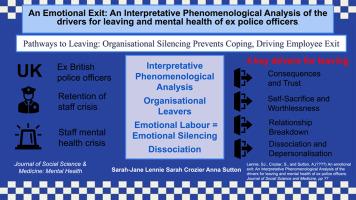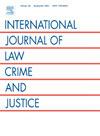情感退出:前警官离职动因与心理健康的解释性现象学分析
IF 1.4
4区 社会学
Q3 CRIMINOLOGY & PENOLOGY
International Journal of Law Crime and Justice
Pub Date : 2025-09-23
DOI:10.1016/j.ijlcj.2025.100787
引用次数: 0
摘要
本文探讨了前英格兰和威尔士警察的情绪劳动,并绘制了对他们心理健康的影响和离开他们角色的途径。利用解释性现象学分析,本文将重点放在那些已经离开服务并且不再受其职业“感觉和表现规则”约束的军官的无限制声音上,从而提供了一个独特的视角,而不是经常被工作和压力研究所捕获。对七名前警务人员进行了现象学访谈。离职的四个关键驱动因素(后果和信任、自我牺牲和无价值、关系破裂、分离和人格解体——一种文化)交织在一起,成为强大的有害叙述,说明了情绪抑制的破坏性组织期望导致逃避性应对和情绪异化,官员表现出一系列分离行为。组织政策和程序,以及高级官员和主管的态度都清楚地表明,情绪表达是一个弱点。本文阐明了理论和实践的含义,并提供了一个地图,说明了许多关于情绪抑制的破坏性组织期望的例子,这些期望随着时间的推移而积累并影响个人和组织的后果。本文章由计算机程序翻译,如有差异,请以英文原文为准。

An emotional exit: An interpretative phenomenological analysis of the drivers for leaving and mental health of ex police officers
This article explores the emotional labour of ex England and Wales police officers and charts the impact upon their mental health and pathways to leaving their roles. Utilising Interpretative Phenomenological Analysis this paper focuses on the unrestricted voice of officers who have left the service and are no longer bound by the ‘feeling and display rules’ of their profession, thereby offering a unique perspective not often captured by work and stress research. Phenomenological interviews were conducted with seven ex-police officers. Four key drivers for leaving (Consequences and Trust, Self-Sacrifice and Worthlessness, Relationship Breakdown, and Dissociation and Depersonalisation – a culture) intersect as powerful detrimental narratives, illustrating damaging organisational expectations of emotional suppression leading to avoidant coping and emotional alienation, with officers expressing a range of dissociative behaviours. Organisational policy and procedures, and the attitude of senior officers and supervisors send clear signals that emotional expression is a weakness. Implications for theory and practice are illuminated and the paper provides a mapping that illustrates numerous examples of damaging organisational expectations about emotional suppression that accumulate over time and impact individual and organisational consequences.
求助全文
通过发布文献求助,成功后即可免费获取论文全文。
去求助
来源期刊
CiteScore
2.70
自引率
0.00%
发文量
25
审稿时长
47 days
期刊介绍:
The International Journal of Law, Crime and Justice is an international and fully peer reviewed journal which welcomes high quality, theoretically informed papers on a wide range of fields linked to criminological research and analysis. It invites submissions relating to: Studies of crime and interpretations of forms and dimensions of criminality; Analyses of criminological debates and contested theoretical frameworks of criminological analysis; Research and analysis of criminal justice and penal policy and practices; Research and analysis of policing policies and policing forms and practices. We particularly welcome submissions relating to more recent and emerging areas of criminological enquiry including cyber-enabled crime, fraud-related crime, terrorism and hate crime.

 求助内容:
求助内容: 应助结果提醒方式:
应助结果提醒方式:


